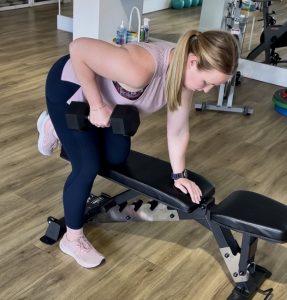Medication can be anything from mildly helpful to lifesaving and is 100% needed as part of many holistic treatment plans. But with today’s hustle culture, we often turn to medication as the primary solution and “quick fix” to our health concerns. Sometimes however, we can overlook a “pill” that has proven to reduce the risk of practically all chronic diseases. What is this magic pill you ask? According to a study published by Booth et al (2000), “no single intervention has greater promise than exercise to reduce the risk of virtually all chronic diseases simultaneously”…pretty powerful stuff!
But wait…what if your health or physical function is the thing that is holding you back!? Enter Accredited Exercise Physiologists…your health and exercise superheroes 🦸🏻♀️
Exercise Physiologists (EPs) are university trained, allied health professionals who specialise in prescribing exercise as a therapy, working predominantly in clinical settings, although are co-credentialed as Exercise Scientists so can also help with sport and exercise performance.
So how can Exercise Physiologists help through exercise as a therapy?
Traditionally, exercise has been seen as a tool to get fit and lose weight, but its therapeutic potential goes beyond just physical fitness. Regular physical activity has been shown to prevent and manage a wide range of chronic health conditions, increase mood and boost energy levels, and most importantly improve overall quality of life.
Exercise can support and improve many health states and conditions, here’s a few key ones where it can have a BIG impact!
- Metabolism: Working to increase your muscle mass through strength training has been shown to increase metabolism. Basically, the more muscle we have, the more energy we burn at rest. This can have flow on effects to weight loss and weight control, in conjunction with qualified dietary advice and addressing other influenced such as hormones (e.g. insulin resistance).
- Pain management: Exercise can relieve pain experienced within conditions, such as arthritis, tendinopathies and chronic pain. Exercise has shown to have an analgesic effect, potentially due to the inhibition of pain pathways, strengthening of muscles, improvements in joint mobility and mood boosting effects.
- Bone health: Weight bearing exercise has been shown to preserve density and even rebuild certain elements of bone. With much of the benefits coming from exercise modes such as impact training and weightlifting, it’s important that prescription is tailored to the individual to prevent injury or fractures. This is particularly important for anyone with known low bone density or osteoporosis, as well as those who have a family history.

- Insulin resistance: Regular physical activity helps regulate blood glucose (blood sugar) levels. Diabetes Australia have suggested up to 60% of all cases of Type 2 Diabetes (T2DM) can be delayed or prevented with changes to diet and lifestyle. Strength training particularly has been shown to have lasting improvements in insulin sensitivity directly at the muscles.
- Mental Health: Exercise has been shown to reduce symptoms of anxiety, depression, and stress by releasing endorphins, which act as natural mood elevators. It can also improve cognitive function, enhance mental clarity and self-esteem, regulate mood and improve sleep quality…so much positive impact!
- Cardiovascular Health: According to the Australia Heart Foundation, cardiovascular disease kills one Australian every 18 minutes. Exercise has been shown to lower blood pressure, improve your lipid profile (cholesterol level), and improve heart health. It’s extremely beneficial in preventing and managing conditions like hypertension, hypercholesterolemia, coronary artery disease and other cardiovascular diseases.
- Cancer: Exercise can provide a wide range of physical and psychological benefits individuals currently undergoing treatment, as well as cancer survivors. Exercising throughout treatment has shown to mitigate treatment related symptoms such as fatigue, nausea, pain and reduce any treatment related decline in cardiovascular and bone health. Additionally, long-term exercise post treatment is crucial in improving overall quality of life, reducing risk of recurrent cancer and prevent development of chronic conditions that have an increased risk following treatment.
Claim on Your Exercise Sessions!
Exercise physiologists are one the fastest growing allied health professions, due to the increasing emphasis on preventative health care and rising awareness of exercise benefits on health. They are the exercise “experts” who guide individuals in harnessing the power of physical activity.

Services delivered by an Accredited Exercise Physiologist are also claimable under compensable schemes including:
- Medicare – Chronic Disease Management (CDM) plans, Team Care Arrangements (TCA)
- Private health insurance
- Work Cover
- NDIS – Plan managed
- TAC
The next time you or your loved one are faced with a health challenge, or you want to get ahead of the game with preventative health, consider seeking the support and guidance of an Exercise Physiologist.
Let’s pop those exercise pills and get moving!
Sam x

Samantha Murray, Exercise Physiologist

